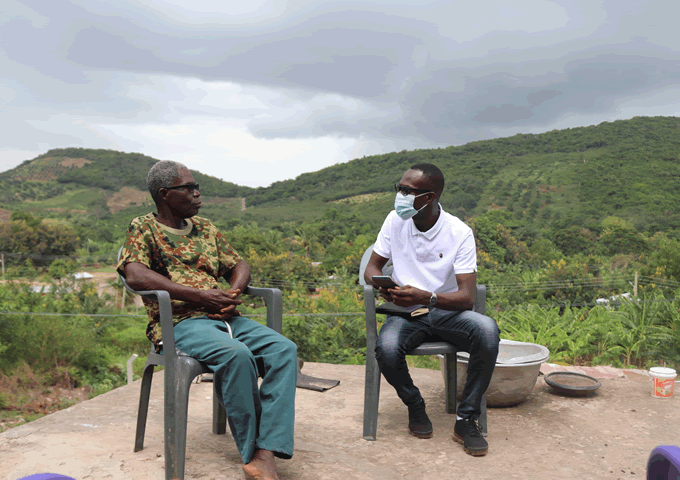In the vast expanse of lush greenery within the Abonse community located in the Eastern Region, our Mango-Pine project team engaged in a heartfelt conversation with Elder Ansah, a highly experienced mango farmer residing in the community. With a 16-acre mango farm under his ownership, Elder Ansah, alongside his family, diligently oversees its operations. This agricultural venture was bequeathed to him by his father, and for decades, he has progressively expanded its size.
Our project team first encountered Elder Ansah during an initial community engagement. During our visit, Elder Ansah vividly recounted the evolution of his family’s farm, reflecting upon the triumphs they have achieved including the invaluable support it has provided in educating his children. However, Elder Ansah’s narrative was not without acknowledging the formidable challenges they had encountered along the way.
As we ventured into numerous communities, engaging with smallholder farmers, it became evident that many initially hesitated to adopt the innovative agricultural practices we proposed. However, Elder Ansah stood as a shining example of receptiveness and enthusiasm from the very beginning. His genuine interest in the solutions our team introduced, aimed at addressing the myriad challenges faced by smallholder farmers, was evident right from the onset. It became evident that inadequate technical know-how regarding good agronomic practices and the presence of weak farmer cooperatives were among the significant factors affecting these farmers. Elder Ansah, in alignment with our findings, expressed that these very challenges had greatly impacted his farming business. He openly admitted that his knowledge of modern farming methods and effective farm management was lacking. Therefore, it came as no surprise when Elder Ansah actively participated in our training sessions at the commencement of the project, eagerly seeking to bridge the knowledge gap and improve his farming practices.
Some few months down the line,Elder Ansah sounds happier and more confident. The yields are coming up nicely and the expectation of increased income fuels hope and happiness in his household. As one of the beneficiaries of the project, this is what he had this say, “Thanks to the training on GAPs and record-keeping through the Mango-Pine project, I can now effectively control pests and safely use pesticides, reducing infestations on my farm. This has significantly increased my mango yield. The farm record training has also helped me keep track of everything that happens on my farm. Based on what I’ve seen on my farm this season, I can confidently say that I will be able ‘break’ into a great harvest and earn a lot of money. Thanks to WACOMP-UNIDO and CDO”.
Elder Ansah’s words serve as a powerful testament to the project’s capacity to empower smallholder farmers, including himself. By providing targeted training, the project has bestowed beneficiaries with the necessary knowledge and skills to surmount challenges and attain remarkable outcomes.
So far, the strides made by the Mango-Pine project include providing technical assistance to 124 smallholder farmers, equipping them with valuable knowledge and resources to empower them to operate more effectively and sustainably. The technical training focused on good agronomic practices (GAPs), personal protective equipment (PPEs), pest management, and farm records keeping. The project has also conducted technical and managerial training for the executives of two farmer cooperatives on a wide range of topics with particular focus on leadership, conflict management and filing & records keeping to facilitate their ability to lead their respective associations and navigate potential challenges successfully.



